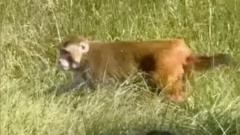Did a Mississippi Mom Shoot an Escaped Research Monkey?

Published: 2025-11-03 14:00:14 | Category: wales
A recent incident in Mississippi has raised concerns regarding public safety and the handling of biomedical research animals after a truck carrying Rhesus monkeys overturned, leading to one monkey being shot by a local resident. The monkeys, which escaped during transport, were reportedly housed at Tulane University's National Biomedical Research Center for research purposes. Although officials from the university assured the public that the monkeys did not harbour any infectious agents, the incident has sparked fear among residents, highlighting the complexities of handling research animals safely.
Last updated: 02 October 2023 (BST)
What’s happening now
The incident has garnered significant media attention, particularly following the shooting of the monkey by Jessica Bond Ferguson, a Mississippi mother. Ferguson stated that she acted out of fear for her children's safety after her son spotted the monkey in their backyard. Despite assurances from Tulane University that the animals were not carrying infectious agents, the presence of an escaped animal has understandably alarmed local residents. The situation remains tense as local authorities manage the fallout from the escape and the subsequent shooting.
Key takeaways
- A monkey shot by a local resident in Mississippi after it escaped from a truck.
- The Rhesus monkeys were being transported from a biomedical facility but were not under Tulane University's care.
- Residents expressed concern over the potential health risks associated with the escape.
Timeline: how we got here
The timeline of events surrounding the escape and shooting includes several key moments:
- 24 September 2023: A truck transporting Rhesus monkeys overturns, leading to the escape of the animals.
- 25 September 2023: Reports emerge of monkeys sighted in the vicinity of the accident.
- 26 September 2023: Jessica Bond Ferguson shoots one of the escaped monkeys, citing safety concerns for her children.
- 27 September 2023: Tulane University issues statements clarifying its non-involvement in the transport of the monkeys.
What’s new vs what’s known
New today/this week
The most significant development has been the shooting of the monkey, which has raised questions about public safety and the ethical treatment of research animals. Residents have reported feeling unsafe due to the presence of the escaped monkeys, despite officials stating that they did not pose a health risk.
What was already established
Prior to this incident, it was known that Rhesus monkeys are used extensively in biomedical research, particularly for studies related to infectious diseases. The monkeys were being transported when the truck overturned, a detail that sparked confusion regarding ownership and the circumstances of their transport.
Impact for the UK
Consumers and households
While this incident took place in the United States, it serves as a cautionary tale for UK residents concerning the transportation of research animals. The presence of escaped animals could pose similar safety concerns, especially if local communities are not informed about such incidents promptly.
Businesses and jobs
For businesses involved in biomedical research and animal transport, this incident may prompt a review of safety protocols and handling procedures. Ensuring the secure transportation of research animals is critical to prevent similar situations that could lead to public panic and potential harm.
Policy and regulation
This event may lead to calls for stricter regulations concerning the transport of animals used in research. In the UK, existing guidelines may be scrutinised to prevent future incidents and ensure the safety of both the public and the animals involved.
Numbers that matter
- 60 feet (approximately 18 metres): the distance from which the monkey was shot by Ferguson.
- 5: the number of children Ferguson has, highlighting the potential impact on families in the area.
- Rhesus monkeys are commonly used in over 90% of research studies related to infectious diseases.
Definitions and jargon buster
- Rhesus monkeys: A species of monkey widely used in biomedical research due to their genetic similarities to humans.
- Biomedical research: Research aimed at understanding health and disease, often involving the study of biological processes in animal models.
How to think about the next steps
Near term (0–4 weeks)
Local authorities are likely to conduct investigations into the circumstances surrounding the truck overturning and the escape of the monkeys. Community meetings may be held to address residents’ concerns and ensure their safety.
Medium term (1–6 months)
In response to this incident, there may be discussions surrounding improved regulations for the transport of research animals. Stakeholders in the biomedical research community may also evaluate their safety protocols to prevent future occurrences.
Signals to watch
- Updates from local authorities regarding the investigation into the truck accident.
- Statements from Tulane University and other involved parties about their policies on the transport of research animals.
- Public feedback and community meetings addressing safety concerns.
Practical guidance
Do
- Stay informed about local wildlife and potential safety concerns in your area.
- Report any unusual animal sightings to local authorities immediately.
- Follow updates from relevant institutions regarding the transport of animals used in research.
Don’t
- Don’t approach unfamiliar wildlife; it can be unpredictable and dangerous.
- Don’t assume that all escaped animals pose a direct threat without verifying the information.
Checklist
- Stay updated on local news regarding animal transport incidents.
- Have a plan for how to respond to wildlife encounters.
- Ensure children understand how to safely react if they encounter an animal.
Risks, caveats, and uncertainties
There are various uncertainties surrounding the incident, including the exact cause of the truck overturning and the total number of monkeys involved. Additionally, while officials have stated that the monkeys did not carry infectious agents, this may not alleviate public fears or concerns. Continuous monitoring and transparent communication from authorities will be essential to maintain public trust.
Bottom line
The shooting of a Rhesus monkey in Mississippi following its escape from a transport truck highlights significant concerns regarding public safety and the handling of research animals. While the incident appears to be isolated, it prompts a broader discussion about the policies governing the transport of biomedical research animals and the precautions necessary to ensure public safety.
FAQs
What happened to the monkeys that escaped in Mississippi?
One monkey was shot by a local resident, while others were reportedly captured and secured by local wildlife officials.
Are Rhesus monkeys dangerous to humans?
While Rhesus monkeys can carry diseases, officials stated that the monkeys involved in this incident did not harbour any infectious agents.
What safety measures are in place for transporting research animals?
Transporting research animals typically involves strict regulations and safety protocols to prevent escapes and ensure public safety. The incident may prompt a review of these measures.



